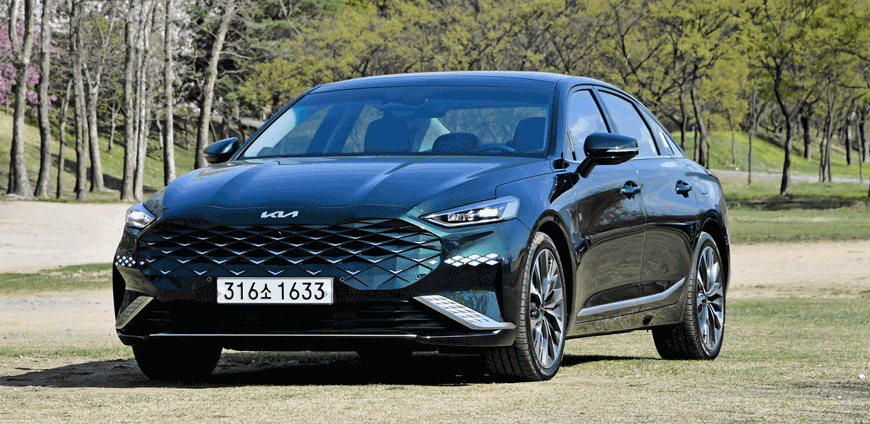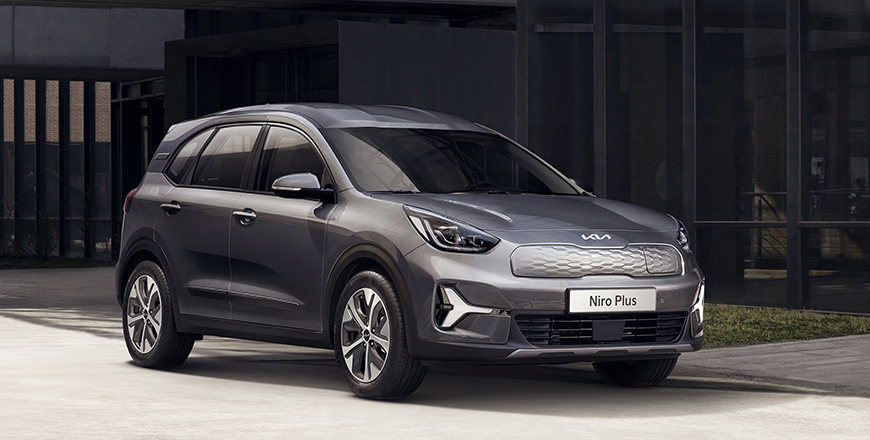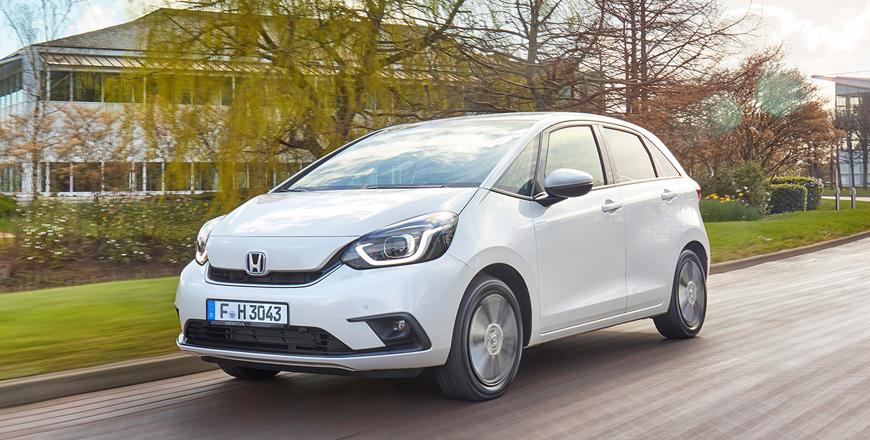You are here
Kia K8 HEV: Class, comfort and confidence
By Ghaith Madadha - Jun 05,2023 - Last updated at Jun 05,2023

Photo courtesy of Kia
Making it global debut in 2021 and introduced to regional markets in recent weeks as part of a multimodel hybrid electric vehicle launch, the Kia K8 HEV is the Korean manufacturer’s electrified answer to large, luxurious and sportily flavoured front-drive saloons like the Nissan Maxima.
Only second to the full-size luxury K9 among Kia’s saloon model range, the K8 brings a decidedly more dramatic design, more up-market experience and a host of new or improved technologies and features over its Kia Cadenza predecessor.
Aggressive aesthetic
Longer, lower and with a pronounced and predatory style, the Karim Habib-designed K8 builds on and reinterprets the modern Kia aesthetic and signature “tiger nose” grille, as first fashioned by Peter Schreyer in the late 2000s, and includes the outgoing Cadenza. With a more aggressive aesthetic, the K8 has a somewhat marine-inspired flavour. Shark-like with its slim scowling headlights, high waistline, sculpted surfacing, low-slung flowing roofline and fin-like bonnet ridges, the K8’s vast, hungry and upright grille, however, takes centre stage with a stylised diamond-like pattern.
Extending beyond the grille’s functional airflow aperture, the diamond pattern is meanwhile echoed for the K8’s angled lower running lights and side indicators. With grille, lower intake and low roof emphasising the horizontal dimension, the K8’s slim full-width rear lights meanwhile sit below a curt fastback-like boot with built-in spoiler, and draw attention to width, and — with a boomerang-like side profile — create a sense of momentum. The K8 HEV’s design meanwhile does not detract from that of regular petrol-powered versions with any unnecessary colours or elements, and is only identifiable by discrete badges.
Complementary combination
Powered by a combination of turbocharged 1.6-litre direct injection four-cylinder combustion engine developing 177BHP at 5,500rpm and 195lb/ft torque throughout 1,500-4,500rpm, the K8 HEV’s output is complemented with an electric synchronous motor producing 59BHP at 1,600-2,000rpm and 194lb/ft torque as early as 0-1,600rpm. Totaling at 227BHP at 5,500rpm and as a 258lb/ft at 1,500-4,400rpm as a combined system output, the K8 HEV is a confidently muscular performer, loosely estimated to be capable of 0-100km/h in around 8-seconds, while also returning frugal 5.9l/100km combined cycle fuel consumption.
Driven briskly on mostly flat roads with brief but intense short bursts of acceleration, the K8 was in its element is being able direct its combined output to the task at hand, with its regenerative brakes having sufficient opportunity to recoup charge for its batteries. Impressively immediate with its punchy low and mid-range torque that underlays its power accumulation, such conditions play to the K8 HEV’s strengths and do not deplete its electric motor’s batteries, as often occurs when hybrids are driven at high power and heavy load on sustained and steep inclines.
Consummate cruiser
Thrusting forward with a sense of indefatigability at speed, the K8 HEV’s is smooth and refined as it builds momentum with disdainful ease and overtakes with effortless versatility. More impressive for a turbocharged hybrid, the K8 HEV’s engine and driveline were more responsive to throttle lift-off in winding down. Driving the front wheels with a brief chirp of the tires under full throttle from standstill and low speed, the K8 HEV’s 6-speed automatic gearbox meanwhile proved smooth and reasonably quick through ratios when using its steering wheel-mounted manual mode paddle shifters.
A consummate highway cruiser that confidently and comfortably crunches the kilometres away, the K8 HEV is smooth, stable and refined at speed. Dispatching highway imperfections with a forgiving ride quality, the K8 HEV meanwhile similarly absorbed lower speed bumps and potholes encountered during test drive on Riyadh roads in its stride, even with its large wheels and low profile 245/40R19 tyres. A seemingly better settled car in vertical movement than its smaller K5 sister, the K8 has an almost wafting quality to its ride characteristics.
Smooth and spacious
A better handling car than expected of large front-drive saloons, the K8 HEV turns in with comparative tidiness and quick, direct and light steering. Pushed too hard into or out of corners, its natural inclination is for slight understeer as expected, but this can be averted by electronic stability interventions, or by easing off the throttle. Stable through fast sweeping corners, the K8 settles into body lean in a progressive and confidently predictable manner. Gripping hard at the rear, it meanwhile remains little perturbed by mid-corner road cracks and imperfections.
Classy and comfortable, the K8 HEV’s quiet cabin is a premium affair with open pore wood and diamond pattern door trim and leather, while its big, well-adjustable front seats feature plush leather upholstery. Interior design is horizontally-oriented with a large side-by-side tablet style digital instrument panel and infotainment screens. Front space, boot space and rear shoulder and legroom are terrific, but a low roofline does mean that rear headroom is not as generous as ideal for tall passengers. Thoroughly well equipped, the K8 HEV meanwhile features numerous comfort, convenience, safety and driver assistance systems.
TECHNICAL SPECIFICATIONS
Engine: 1.6-litre, turbocharged transverse 4-cylinders, & synchronous electric motor
Bore x stroke: 72 x 97mm
Valve-train: DOHC, 16-valve, continuously variable valve timing
Gearbox: 6-speed automatic, front-wheel-drive
Petrol engine power, BHP (PS) [kW]: 177 (180) [132] @5,500 rpm
Electric motor power, BHP (PS) [kW]: 59 (60) [44.2] @1,600-2,000rpm
Combined power, BHP (PS) [kW]: 227 (230) [169] @5,500rpm (estimated)
Petrol engine torque, lb/ft (Nm): 195 (265) @1,500-4,500rpm
Electric motor torque, lb/ft (Nm): 194 (264) @0-1,600rpm
Combined torque, lb/ft (Nm): 258 (350) @1,500-4,400rpm (estimated)
0-100km/h: approximately 8-seconds (estimate)
Fuel consumption, combined: 5.9l-litres/100km
CO2 emissions: 96g/km
Length: 5,015mm
Width: 1,875mm
Height: 1,455mm
Wheelbase: 2,895mm
Overhang, F/R: 950/1,170
Track, F/R: 1,621/1,627mm
Minimum ground clearance: 145mm
Headroom, F/R: 978/955mm (with panoramic sunroof)
Leg room, F/R: 1,170/930mm
Luggage volume: 510-liters
Doors/seats: 4/5
Unladen weight: 1,650kg
Steering: Electric-assisted rack and pinion
Suspension, F/R: MacPherson struts/multilink
Brakes F/R: Ventilated discs/discs, regenerative braking
Tyres: 245/40R19
Related Articles
A thoroughly better appointed, equipped and designed vehicle than it has ever been since its 2002 introduction, the Kia Sorento has over the
Introduced globally early last year, the Kia Niro Plus arrived just months after the late 2021 launch of an all-new second generation
Launched early last year, the fourth generation of the modern incarnation of the Honda Jazz is a small but practical city car, built from th


















